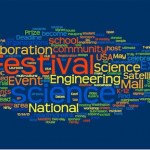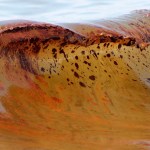Uncategorized
Brookhaven National Laboratory is a multipurpose research laboratory funded by the U.S. Department of Energy. Located on Long Island, NY, Brookhaven operates large-scale facilities for studies in physics, chemistry, biology, medicine, applied science, and advanced technology. The Laboratory's almost 3,000 scientists, engineers, and support staff are joined each year by more than 5,000 visiting researchers from around the world.
And, they now blog at Scienceblogs!!! Go welcome Brookhaven.
Yes, there is a trend. Scienceblogs is adding a number of institutions as bloggers. This is going to…
Tell us now and we will turn your answers into a beautiful Word Cloud! Deadline to submit is June 30. See the results in the next newsletter!
Over the next few months, we will create multiple "Word Clouds" aka "Wordles" showcasing your answers to questions relating to science & engineering. On October 23, Satellite Event attendees around the nation will participate in a nationwide Wordle: see it change on our website as people enter their answers!
Wordle.net is toy to create beautiful word clouds from text. The word clouds give greater prominence to words that appear more frequently in…
Three peacekeepers have been killed in Sudan's Darfur region, officials say.
The peacekeepers, from Rwanda, came under attack in West Darfur, an official with the joint UN-African Union force told Reuters news agency.
They were guarding a new base under construction in an area where there have been attacks in the past.
More at BBC
This blog does more than sit there ... blogging. Sometimes it reaches out and does something real. And this year, GLB sponsored (in part) a runner in the Grandma's Marathon, in Duluth, MN.
Asha Shoffner ran the half marathon with a time of 1:48:14. This is Asha's Blog. The producers, writers, and staff of Greg Laden's blog are very proud to have had this opportunity.
FOR IMMEDIATE RELEASE
WASHINGTON, D.C. (June 3, 2010) - Who said scientists can't dance? The American Association for the Advancement of Science (AAAS) is proud to announce the third annual "Dance Your Ph.D." interpretative dance video contest. The contest, which is open to anyone with a Ph.D. or pursuing a Ph.D. in a science-related field, asks scientists to transform their research into an interpretive dance. Winners of each of the four categories (physics, chemistry, biology, and social sciences) will receive $500, then compete head-to-head for an additional $500 grand prize for best…
Clive Thompson has a wonderful article in the NY Times Magazine on Watson, the supercomputer programmed to excel at Jeopardy. Thompson delves into the clever heuristics used to generate singular answers to ambiguous questions. (Watson relies on massive amounts of parallel processing, so that "he" is running thousands of Google searches simultaneously.) While Watson's performance is certainly impressive, I thought the most interesting part of the story involved the failings of the machine. It's easy to rhapsodize about the ever escalating speed of microchips, but it turns out that Watson is…
Oddly, Bill O'Reilly seems to have her on the run.
Wave breaking in Alabama (Photographer Dave Martin/AP) versus wave in Hawaii (Photographer Clark Little)
Which do you prefer?
The next installment of "Everything you Know is Sort of Wrong" will be on the falsehood: "Humans evolved from apes." Or, if you prefer, "Humans did not evolve from apes." Either way, you're wrong. And right.
Confused? Great, then we're half way there! Here's the details. (This is part of the Skeptically Speaking broadcast.) Please post your questions and tune in on Friday.
Image: wemidji (Jacques Marcoux).
Nam et ipsa scientia potestas est (And thus knowledge itself is power)
-- Sir Francis Bacon.
The most recent issue of Scientia Pro Publica (Science for the People); "Scientia Pro Publica 32: Biology Overload" was published by Philip at his blog, The Dichotomous Trekkie 2.0. This was Philip's first ever blog carnival, and he did an excellent job! So go there, leave some warm fuzzies for Philip, then read the linked essays and be sure to leave your comments on at least one of those essays, either telling those authors what they did well, or making…
The blogger(s?) at You're Not Helping have tried, really tried, to help. But in such a ham-handed, erratic, uneven, capricious, ad hominem (in that, if you're PZ Myers you must be wrong) way, that they have polarized where they could have rallied, obfuscated where they could have clarified, and alienated where they could have allied. A classic case of alienation is that of commenter Oedipus Maximus. It would appear that Oedipus showed up on the YNH blog interested in what they were saying, engaged in the conversation, then somehow got the author(s) of YNH pissed off. He seems to have hit…
During the 1970s, international aid agencies came up with a brilliant plan to stem a plague of water-borne illnesses in the Asian country of Bangladesh. They would underwrite the installation of wells in disease-troubled villages, tapping into the cleaner ground water below.
They would use simple, relatively inexpensive tube wells, place thousands of these over-sized drinking straws into the shallow aquifers. And these straws - millions of them - would suck up the cleaner, microorganism free water in healthy abundance.
At first, it seemed to work like a blessing. Infant mortality…
Assault charges, censure, impeachment. Throw the bum out.
And replace him with another Democrat, of course.
[This post was originally published at webeasties.wordpress.com]
A recent paper published online in the Proceedings of the Royal Society B (I have no idea what the B means, but maybe one of you can clarify with a comment) draws an enticing connection between whale excrement and climate change. Because this study involved whale poop, it even made the mainstream news. The folks at MSN were even nice enough to provide an areal photo of what it looks like when a whale goes to the bathroom. I have been lucky enough to experience this first hand on a whale watch when a whale…
[This post was originally published at webeasties.wordpress.com]
A recent paper published online in the Proceedings of the Royal Society B (I have no idea what the B means, but maybe one of you can clarify with a comment) draws an enticing connection between whale excrement and climate change. Because this study involved whale poop, it even made the mainstream news. The folks at MSN were even nice enough to provide an areal photo of what it looks like when a whale goes to the bathroom. I have been lucky enough to experience this first hand on a whale watch when a whale…
There is a review of "Merchants of Doubt" by Oreskes at the Economist.
This quote shows roughly their take:
In this powerful book, Naomi Oreskes and Eric Conway, two historians of science, show how big tobacco's disreputable and self-serving tactics were adapted for later use in a number of debates about the environment. Their story takes in nuclear winter, missile defence, acid rain and the ozone layer. In all these debates a relatively small cadre of right-wing scientists, some of them eminent, worked through organisations sometimes created specially for the purpose to take on a scientific…
I have spent about a week trying to figure out how to start this review. You see, I've had a lot more time than I thought to write it. I brought Vanessa Wood's Bonobo Handshake with me on my vacation assuming that it would give me something to read during the long hours I've spent traveling between my various family members in New Hampshire, Vermont, Massachusetts and California. I planned on writing this review next week sometime, once I'd finally managed to finish it on my long flight back to Hawaii.
The problem is, I started reading Bonobo Handshake the first night I arrived in New…
"We must not forget that when radium was discovered no one knew that it would prove useful in hospitals. The work was one of pure science. And this is a proof that scientific work must not be considered from the point of view of the direct usefulness of it. It must be done for itself, for the beauty of science, and then there is always the chance that a scientific discovery may become - like the radium - a benefit for humanity." - MARIE CURIE



